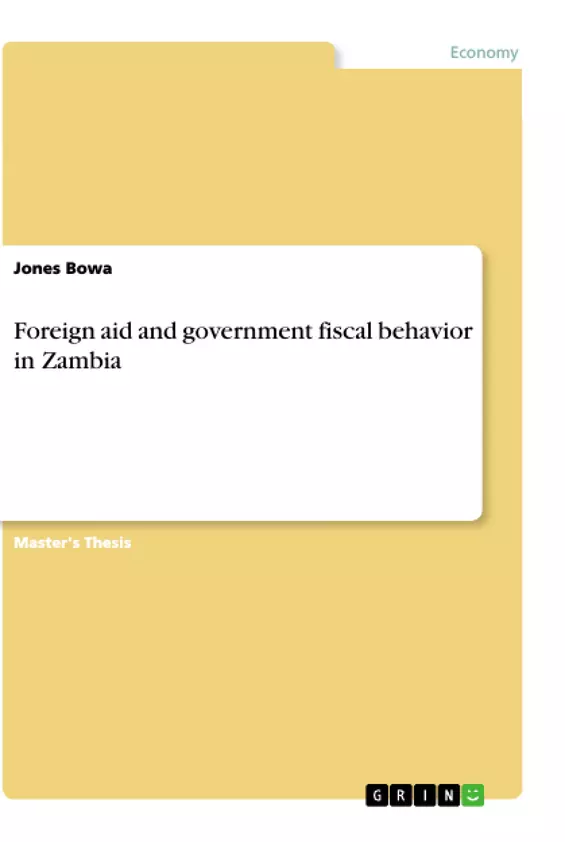The paper investigates the relationship between foreign aid and government fiscal behavior. An overview of the global trend of foreign aid flows over the last few decades is provided, as well as literature and research on fiscal response studies that have aimed to examine how these aid flows influence the fiscal decisions of aid recipient governments. The paper assesses the impact of foreign aid flows on fiscal aggregates, taking into focus the case of Zambia. In particular, the paper goes into detail examining how government investment, consumption, revenue, and domestic borrowing are associated with both aggregated and disaggregated aid.
The paper adopts a quantitative approach in its analysis. A Vector Error Correction approach was used to estimate the relationship between foreign aid and fiscal aggregates data for Zambia over the period 1970-2014. The econometric estimation used annual data and analyzed both short-run and long-run effects.
The following were the findings:
Foreign aid flows were found to be positively associated with government investment, consumption, and domestic borrowing. While government revenue was negatively associated with foreign aid. In the short-run, it was observed that grants were used to reduce the level of the country’s domestic debt stock. Whereas, net foreign loans were seen as a substitute for domestic revenues and were used to finance the budget deficit.
The paper concluded by providing a number of recommendations that suggested improvement in government’s revenue mobilization efforts, effective management of the country’s domestic debt, and the deliberate action to direct revenue resources towards investment expenditure. In order to achieve sustained growth and ensure the effective use of aid, donor partners were recognized as important actors in supporting the government’s fiscal policy direction.
There has been high momentum in the scaling up of foreign aid in recent years. The turn of the millennium saw calls by the development community to increase foreign aid to developing countries so as to assist them in attaining the Millennium Development Goals. The mechanisms through which foreign aid flows are transmitted to recipient countries require that the aid resources are channeled through the government. Thus, for foreign aid to have any meaningful impact is highly dependent on how governments respond to inflows of aid.
Inhaltsverzeichnis (Table of Contents)
- CHAPTER 1: INTRODUCTION
- 1.1 Background
- 1.1.1 Zambia Case Overview
- 1.2 Aid Effectiveness
- 1.2.1 Aid Volatility
- 1.2.2 Aid Heterogeneity
- 1.3 Problem Statement
- 1.4 Research Objective
- 1.5 Structure of the Study
- CHAPTER 2: LITERATURE REVIEW
- 2.1 Theoretical Review
- 2.1.1 Foreign Aid and Government Expenditure
- 2.1.2 Foreign Aid and Government Revenue
- 2.1.3 Foreign Aid and Domestic Borrowing
- 2.1.4 Disaggregated Aid and Fiscal Aggregates
- 2.2 Empirical Studies
- CHAPTER 3: METHODOLOGY
- 3.1 The Fiscal Response Model
- 3.2 Model Estimation
- 3.3 Data and Variables
- CHAPTER 4: EMPIRICAL RESULTS
- 4.1 Trend of Foreign Aid and Fiscal Aggregates
- 4.2 Unit Root and Cointegration Analysis
- 4.3 Vector Error Correction
- 4.3.1 Model of Net Foreign Aid
- 4.3.2 Model of Grants
- 4.3.3 Model of Net Foreign Loans
- 4.4 Results Summary and Study Limitations
Zielsetzung und Themenschwerpunkte (Objectives and Key Themes)
This dissertation investigates the relationship between foreign aid and government fiscal behavior in Zambia. It examines how inflows of foreign aid impact government investment, consumption, revenue, and domestic borrowing. The study aims to assess the effectiveness of foreign aid in achieving its intended development goals by analyzing the government's fiscal response to aid inflows.
- The impact of foreign aid on government fiscal behavior in Zambia
- The relationship between foreign aid and government spending, revenue, and domestic borrowing
- The effectiveness of foreign aid in promoting sustainable development
- The challenges and limitations of using foreign aid for development in Zambia
- Recommendations for improving the use of foreign aid for achieving development goals
Zusammenfassung der Kapitel (Chapter Summaries)
The first chapter introduces the study's background, providing an overview of the Zambian case and the concept of aid effectiveness. It discusses the challenges of aid volatility and heterogeneity and lays out the problem statement, research objective, and the study's structure. Chapter two delves into the literature review, examining theoretical perspectives on foreign aid and government expenditure, revenue, and domestic borrowing. It also explores empirical studies on the fiscal response to foreign aid.
Chapter three outlines the methodology used in the study. It describes the Fiscal Response Model (FRM), the model estimation techniques, and the data and variables employed. Chapter four presents the empirical results, examining the trends in foreign aid and fiscal aggregates, conducting unit root and cointegration analyses, and utilizing a Vector Error Correction (VEC) approach to estimate the relationship between foreign aid and fiscal aggregates. This chapter also summarizes the findings and discusses the limitations of the study.
Schlüsselwörter (Keywords)
The dissertation focuses on the relationship between foreign aid and government fiscal behavior, specifically in the context of Zambia. Key terms and concepts include: foreign aid, fiscal policy, government expenditure, revenue, domestic borrowing, aid effectiveness, fiscal response, Vector Error Correction model, Zambia, development economics.
- Citation du texte
- Jones Bowa (Auteur), 2016, Foreign aid and government fiscal behavior in Zambia, Munich, GRIN Verlag, https://www.grin.com/document/931442



